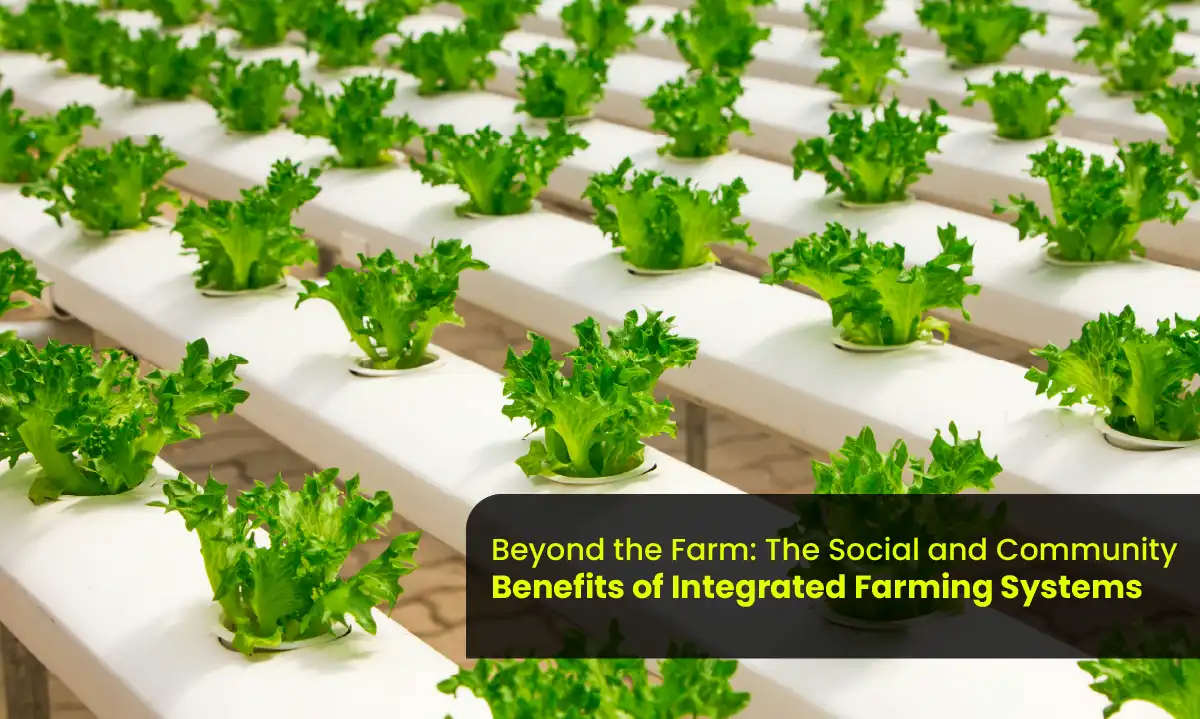Explore the social and community benefits of integrated farming systems that extend beyond the farm

Integrated farming systems, or IFS, are a cutting-edge method of farming that does more than just provide food. They combine several agricultural practices into one cohesive system, including the production of crops, the care of animals, fisheries, and even forests. This all-encompassing method promotes a startling range of social and communal advantages in addition to being beneficial to the environment and your crop. We'll explore the benefits that integrated agricultural systems may provide to communities' social fabric in this blog, with a special emphasis on integrated farming in Chennai.
Environmental Sustainability and Community Health
In order to practice integrated farming, a closed-loop system must be established. One component's waste can be used as a resource for another. For instance, fishpond waste may feed plants growing along the margins of the pond, and cattle dung can be composted to provide fertilizer for crops. This helps to create a healthier environment in addition to lowering need on outside resources like chemical fertilizers. Chennai's community is more sustainable and healthier as a result of reduced water pollution, better soil quality, and cleaner air.
Knowledge Sharing and Local Food Systems
Farmers using integrated agricultural systems frequently need to possess a wider range of skills and a better comprehension of ecological processes. This encourages information exchange among community members. New farmers may learn from seasoned ones, and local knowledge in natural resource management and organic pest control can be freely exchanged. This culture of cooperation fosters self-reliance and expands the community's agricultural knowledge base.
Economic Opportunities and Reduced Poverty
Traditional monoculture farms are not as productive as integrated farms by nature. Farmers benefit from many revenue sources due to the wide range of outputs, which lessens their sensitivity to changes in the market. Moreover, integrated farms frequently make better use of natural resources, which lowers input costs. Farmers will earn more from this, and the town will see the emergence of new business prospects. Integrated agricultural methods have the potential to significantly lower poverty in the peri-urban areas surrounding Chennai by fostering sustainable livelihoods.
Empowering Women and Youth
With its focus on information exchange and varied jobs, integrated farming has the potential to be especially empowering for women and youth in Chennai. When it comes to tasks like growing vegetables, raising chickens, and vermicomposting, women may be quite important. Youth can also work on projects like beekeeping, fish farming, and data collecting for farm management. In addition to advancing gender equality, this gives young people excellent chances for skill development and secures the community's continued use of sustainable agriculture.
Promoting Food Security and Healthy Diets
By their very nature, integrated farms promote the raising of a greater diversity of animals and crops. For the community, this diversity means a more nutrient-rich crop. Access to locally grown, fresh food can help Chennai people maintain healthy diets and lessen their reliance on possibly less nutrient-dense, commercially manufactured foods. Furthermore, integrated farms frequently give preference to organic or low-chemical practices, which improves community health and wellbeing even more.
The Potential of Integrated Farming in Chennai
The peri-urban regions and increasing consciousness of sustainable living in Chennai make it an ideal place to implement integrated agricultural systems. This strategy may be greatly aided by programs, agricultural cooperatives, and government subsidies, among other initiatives. Chennai's organic integrated farming shows a lot of potential in meeting the rising demand for wholesome, locally grown food.
Conclusion
Beyond the farm gate, integrated agricultural systems present an enticing picture for the future of agriculture. Integrated farms provide a substantial contribution to the social fabric of the communities in which they operate by promoting environmental sustainability, information exchange, economic opportunity, and healthier communities. Integrated agricultural methods provide a way ahead for Chennai that feeds the community's spirit as well as its physical needs, as it works toward a more egalitarian and sustainable future.
Latest blogs
JOIN OUR COMMUNITY !
Stay connected with Getfarms! Follow us on social media for the latest updates, exclusive offers, and a glimpse into the world of farmhouse living. Join our community today




























